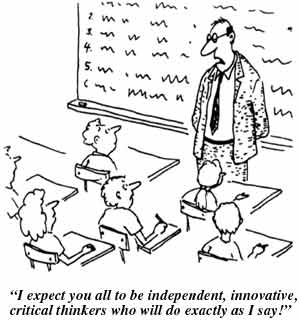I was searching the internet on a few of the sites that Professor Luongo graciously gave us the other night at our on-line chat and eventually stumbled upon one on multiple choice exams. For me, History is a difficult subject to only have multiple choice exams, but when the time comes, here are few helpful hints as to techniques teachers should and should not be using when creating multiple choice questions. For the purposes of this class, some students have a difficult time reading and understanding what the question is asking. This is one problem I have seen more often than not concerning my students. Students may recognize one important person or event and, based on the answer choices, will choose the one that best describes the aforementioned person or event. However, the students have a difficult time analyzing what the questions is really asking them. I have tried to cover this in class many times, but students are still making the same mistakes. Any suggestions? Enjoy the article...
http://pareonline.net/getvn.asp?v=4&n=11
Sunday, September 28, 2008
Saturday, September 20, 2008
Different Types of Questions
http://www.edarticle.com/differentiated-learning/higher-level-thinking-as-easy-as-a-question.html
Although this article may not answer some of your questions on higher order thinking, it definitely gives one perspective on different question/answer methods and techniques. From personal experiences, I find it very difficult, at times, to ask the higher order thinking questions in a discussion forum in the high school setting. For example, my first period class (Freshman World History) this year is having a hard time adjusting to lectures and discussions. They are also unresponsive when lower level thinking questions are asked, so what advice would you give me to get these students to answer lower/higher order thinking questions?
Although this article may not answer some of your questions on higher order thinking, it definitely gives one perspective on different question/answer methods and techniques. From personal experiences, I find it very difficult, at times, to ask the higher order thinking questions in a discussion forum in the high school setting. For example, my first period class (Freshman World History) this year is having a hard time adjusting to lectures and discussions. They are also unresponsive when lower level thinking questions are asked, so what advice would you give me to get these students to answer lower/higher order thinking questions?
Saturday, September 13, 2008
Summer Reading
I have a bit of a problem and I was hoping that you would be able to give me some advice for what I should do. As the students returned from summer recess I have been asked by a few about what the class is responsible for with the summer reading assignment.
I asked my students if they read the assigned book and very few admitted to actually reading it. The summer reading is not stressed in our curriculum, but I still believe that the students should be given a grade in some form. What can I do as their teacher to make sure that the students who did read the book receive credit? I have been thinking about offering extra credit points to those students who read the book as well as wrote a paper on the book. Any suggestions?
I asked my students if they read the assigned book and very few admitted to actually reading it. The summer reading is not stressed in our curriculum, but I still believe that the students should be given a grade in some form. What can I do as their teacher to make sure that the students who did read the book receive credit? I have been thinking about offering extra credit points to those students who read the book as well as wrote a paper on the book. Any suggestions?
Thursday, September 11, 2008
Introduction
Hello everyone. My name is Mark Rindfuss and I am currently teaching World and U.S. History at Paramus Catholic H.S. in Paramus, New Jersey. I was born in Pittsburgh, Pennsylvania (go Steelers) and grew up in Wilmington, Delaware. After graduating from the University of Delaware with a degree in History Education, I decided to make the move to Hoboken. I heard great things about St. Peter's College from co-workers and finally decided to enroll in the Administration and Supervision program. I have had nothing but positive experiences thus far in the program, but eagerly looking forward to graduating this spring.
At first I thought I was very computer savvy until the first night of class when I finally learned the ins and outs of blogging. Being a huge sports fan, blogging has really taken off in the past few years. I have a much better appreciation for those who have the time and ability to keep their blogs up and running.
I really hope to gain a great deal of knowledge in the reading area for high school students because I have noticed that students at this age despise reading. I have tried assigned readings from the textbook as well as current event articles and students make every attempt to get out of reading. If anyone has any suggestions, I would love to hear them.
I hope this works!
At first I thought I was very computer savvy until the first night of class when I finally learned the ins and outs of blogging. Being a huge sports fan, blogging has really taken off in the past few years. I have a much better appreciation for those who have the time and ability to keep their blogs up and running.
I really hope to gain a great deal of knowledge in the reading area for high school students because I have noticed that students at this age despise reading. I have tried assigned readings from the textbook as well as current event articles and students make every attempt to get out of reading. If anyone has any suggestions, I would love to hear them.
I hope this works!
Subscribe to:
Comments (Atom)

.jpg)